Fleurs du Mal Magazine


Or see the index

Lizette Woodworth Reese
(1856–1935)
Oh, Gray And Tender Is The Rain
Oh, gray and tender is the rain,
That drips, drips on the pane!
A hundred things come in the door,
The scent of herbs, the thought of yore.
I see the pool out in the grass,
A bit of broken glass;
The red flags running wet and straight,
Down to the little flapping gate.
Lombardy poplars tall and three,
Across the road I see;
There is no loveliness so plain
As a tall poplar in the rain.
But oh, the hundred things and more,
That come in at the door!—
The smack of mint, old joy, old pain,
Caught in the gray and tender rain.
Lizette Woodworth Reese poetry
fleursdumal.nl magazine
More in: Archive Q-R, CLASSIC POETRY
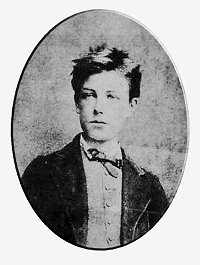
Arthur Rimbaud
(1854-1891)
Fêtes de la faim
Ma faim, Anne, Anne,
Fuis sur ton âne.
Si j’ai du goût, ce n’est guères
Que pour la terre et les pierres
Dinn ! dinn ! dinn ! dinn ! je pais l’air,
Le roc, les Terres, le fer.
Tournez, les faims ! paissez, faims,
Le pré des sons !
Puis l’humble et vibrant venin
Des liserons ;
Les cailloux qu’un pauvre brise,
Les vieilles pierres d’églises,
Les galets, fils des déluges,
Pains couchés aux vallées grises !
Mes faims, c’est les bouts d’air noir ;
L’azur sonneur ;
— C’est l’estomac qui me tire.
C’est le malheur.
Sur terre ont paru les feuilles :
Je vais aux chairs de fruit blettes.
Au sein du sillon, je cueille
La doucette et la violette.
Ma faim, Anne, Anne !
Fuis sur ton âne.
Arthur Rimbaud poetry
fleursdumal.nl magazine
More in: *Archive Les Poètes Maudits, Archive Q-R, Arthur Rimbaud, Rimbaud, Arthur, Rimbaud, Arthur
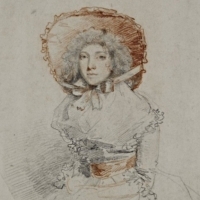
Mary Robinson
(1757?-1800)
All Alone
I
Ah! wherefore by the Church-yard side,
Poor little LORN ONE, dost thou stray?
Thy wavy locks but thinly hide
The tears that dim thy blue-eye’s ray;
And wherefore dost thou sigh, and moan,
And weep, that thou art left alone?
II
Thou art not left alone, poor boy,
The Trav’ller stops to hear thy tale;
No heart, so hard, would thee annoy!
For tho’ thy mother’s cheek is pale
And withers under yon grave stone,
Thou art not, Urchin, left alone.
III
I know thee well ! thy yellow hair
In silky waves I oft have seen;
Thy dimpled face, so fresh and fair,
Thy roguish smile, thy playful mien
Were all to me, poor Orphan, known,
Ere Fate had left thee–all alone!
IV
Thy russet coat is scant, and torn,
Thy cheek is now grown deathly pale!
Thy eyes are dim, thy looks forlorn,
And bare thy bosom meets the gale;
And oft I hear thee deeply groan,
That thou, poor boy, art left alone.
V
Thy naked feet are wounded sore
With thorns, that cross thy daily road;
The winter winds around thee roar,
The church-yard is thy bleak abode;
Thy pillow now, a cold grave stone–
And there thou lov’st to grieve–alone!
VI
The rain has drench’d thee, all night long;
The nipping frost thy bosom froze;
And still, the yewtree-shades among,
I heard thee sigh thy artless woes;
I heard thee, till the day-star shone
In darkness weep–and weep alone!
VII
Oft have I seen thee, little boy,
Upon thy lovely mother’s knee;
For when she liv’d–thou wert her joy,
Though now a mourner thou must be!
For she lies low, where yon grave-stone
Proclaims, that thou art left alone.
VIII
Weep, weep no more; on yonder hill
The village bells are ringing, gay;
The merry reed, and brawling rill
Call thee to rustic sports away.
Then wherefore weep, and sigh, and moan,
A truant from the throng–alone?
IX
“I cannot the green hill ascend,
“I cannot pace the upland mead;
“I cannot in the vale attend,
“To hear the merry-sounding reed:
“For all is still, beneath yon stone,
“Where my poor mother’s left alone!
X
“I cannot gather gaudy flowers
“To dress the scene of revels loud–
“I cannot pass the ev’ning hours
“Among the noisy village croud–
“For, all in darkness, and alone
“My mother sleeps, beneath yon stone.
XI
“See how the stars begin to gleam
“The sheep-dog barks, ’tis time to go;–
“The night-fly hums, the moonlight beam
“Peeps through the yew-tree’s shadowy row–
“It falls upon the white grave-stone,
“Where my dear mother sleeps alone.–
XII
“O stay me not, for I must go
“The upland path in haste to tread;
“For there the pale primroses grow
“They grow to dress my mother’s bed.–
“They must, ere peep of day, be strown,
“Where she lies mould’ring all alone.
XIII
“My father o’er the stormy sea
“To distant lands was borne away,
“And still my mother stay’d with me
“And wept by night and toil’d by day.
“And shall I ever quit the stone
“Where she is, left, to sleep alone.
XIV
“My father died; and still I found
“My mother fond and kind to me;
“I felt her breast with rapture bound
“When first I prattled on her knee–
“And then she blest my infant tone
“And little thought of yon grave-stone.
XV
“No more her gentle voice I hear,
“No more her smile of fondness see;
“Then wonder not I shed the tear
“She would have DIED, to follow me!
“And yet she sleeps beneath yon stone
“And I STILL LIVE–to weep alone.
XVI
“The playful kid, she lov’d so well
“From yon high clift was seen to fall;
“I heard, afar, his tink’ling bell–
“Which seem’d in vain for aid to call–
“I heard the harmless suff’rer moan,
“And grieved that he was left alone.
XVII
“Our faithful dog grew mad, and died,
“The lightning smote our cottage low–
“We had no resting-place beside
“And knew not whither we should go,–
“For we were poor,–and hearts of stone
“Will never throb at mis’ry’s groan.
XVIII
“My mother still surviv’d for me,
“She led me to the mountain’s brow,
“She watch’d me, while at yonder tree
“I sat, and wove the ozier bough;
“And oft she cried, “fear not, MINE OWN!
“Thou shalt not, BOY, be left ALONE.”
IXX
“The blast blew strong, the torrent rose
“And bore our shatter’d cot away;
“And, where the clear brook swiftly flows–
“Upon the turf at dawn of day,
“When bright the sun’s full lustre shone,
“I wander’d, FRIENDLESS — and ALONE!”
XX
Thou art not, boy, for I have seen
Thy tiny footsteps print the dew,
And while the morning sky serene
Spread o’er the hill a yellow hue,
I heard thy sad and plaintive moan,
Beside the cold sepulchral stone.
XXI
And when the summer noontide hours
With scorching rays the landscape spread,
I mark’d thee, weaving fragrant flow’rs
To deck thy mother’s silent bed!
Nor, at the church-yard’s simple stone,
Wert, thou, poor Urchin, left alone.
XXII
I follow’d thee, along the dale
And up the woodland’s shad’wy way:
I heard thee tell thy mournful tale
As slowly sunk the star of day:
Nor, when its twinkling light had flown,
Wert thou a wand’rer, all alone.
XXIII
“O! yes, I was! and still shall be
“A wand’rer, mourning and forlorn;
“For what is all the world to me–
“What are the dews and buds of morn?
“Since she, who left me sad, alone
“In darkness sleeps, beneath yon stone!
XXIV
“No brother’s tear shall fall for me,
“For I no brother ever knew;
“No friend shall weep my destiny
“For friends are scarce, and tears are few;
“None do I see, save on this stone
“Where I will stay, and weep alone!
XXV
“My Father never will return,
“He rests beneath the sea-green wave;
“I have no kindred left, to mourn
“When I am hid in yonder grave!
“Not one ! to dress with flow’rs the stone;–
“Then–surely , I AM LEFT ALONE!”
Mary Darby Robinson poetry
fleursdumal.nl magazine
More in: Archive Q-R, CLASSIC POETRY

Rainer Maria Rilke
(1875-1926)
Wir haben eine Erscheinung
Wir haben eine Erscheinung. Sie steht in den Zimmern, und auf den leeren Plätzen steht sie um Mitternacht, und wenn es Morgen wird, so wird sie deutlicher mit dem Tag, und wir sehen die Häuser durch ihre durchscheinende Gestalt. Ein Revenant ist davon abhängig, wie viele ihn wahrnehmen. Diesen gewahren alle: er ist aus allen Gräbern gestiegen. Alle gewahren ihn. Aber wer erkennt ihn?
Nein. Ihr sollt nicht bekannt tun mit ihm. Ihr sollt ihm nicht das Zubehör und die Zunamen früherer Kriege anhängen, denn ob es gleich ein Krieg ist, so kennt ihr ihn doch nicht. Da man euch Bilder von Greco zeigte, so gabt ihr zu, daß da ein Erleben sei, das ihr nicht kanntet. Und wenn dieser Krieg ein Gesicht hat, so sollt ihr es ansehn wie das Gesicht Amenophis des Vierten, das vorher nicht da war. Ihr sollt davor stehen, wie neulich vor der Tatsache, daß in ein paar Pferden, bisher unangerufen, eine Gegenwart des bestimmtesten Geistes wohnt; ihr sollt als die, die ihr jetzt seid, den leidenschaftlichen Umgang des Todes hinnehmen und seine Vertraulichkeit erwidern; denn was wißt ihr von seiner Liebe zu euch?
Wir haben eine Erscheinung, – und es hat sie mancher angerufen; sie aber weicht nicht und schreitet durch unsere Wände und steht nicht Rede. Weil ihr tut, als kenntet ihr sie. Erhebt eure Augen und kennt sie nicht; schafft ein Hohles um sie mit der Frage eurer Blicke; hungert sie aus mit Nichtkennen! Und plötzlich, in der Angst nicht zu sein, wird euch das Ungeheuere seinen Namen schrein und wegsinken.
Rainer Maria Rilke poetry
fleursdumal.nl magazine
More in: Archive Q-R, Rilke, Rainer Maria
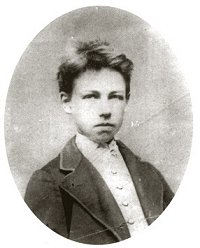
Arthur Rimbaud
(1854-1891)
Scènes
L’ancienne Comédie poursuit ses accords et divise ses Idylles :
Des boulevards de tréteaux.
Un long pier en bois d’un bout à l’autre d’un champ rocailleux où la foule barbare évolue sous les arbres dépouillés.
Dans des corridors de gaze noire suivant le pas des promeneurs aux lanternes et aux feuilles.
Des oiseaux des mystères s’abattent sur un ponton de maçonnerie mû par l’archipel couvert des embarcations des spectateurs.
Des scènes lyriques accompagnées de flûte et de tambour s’inclinent dans des réduits ménagés sous les plafonds, autour des salons de clubs modernes ou des salles de l’Orient ancien.
La féerie manœuvre au sommet d’un amphithéâtre couronné par les taillis, — Ou s’agite et module pour les Béotiens, dans l’ombre des futaies mouvantes sur l’arête des cultures.
L’opéra-comique se divise sur une scène à l’arête d’intersection de dix cloisons dressées de la galerie aux feux.
Arthur Rimbaud poetry
fleursdumal.nl magazine
More in: Archive A-B, Archive Q-R, Arthur Rimbaud, Rimbaud, Arthur

Raymond Radiguet
(1903-1923)
Montagnes russes ou voyage de noces
À ma place
Le lecteur et sa gracieuse compagne
Aux abeilles feraient la chasse
Mon amour Le pot de miel est à moitié vide
Un ciel à peine aussi tranquille
Que le ciel de notre lit
Jeune mariée Violette
Qui souriez sous la voilette
Sans retard réclamez la terre ferme
Raymond Radiguet poésie
fleursdumal.nl magazine
More in: Archive Q-R, Radiguet, Raymond

Christina Georgina Rossetti
(1830-1894)
Remember
Remember me when I am gone away,
Gone far away into the silent land;
When you can no more hold me by the hand,
Nor I half turn to go yet turning stay.
Remember me when no more day by day
You tell me of our future that you planned:
Only remember me; you understand
It will be late to counsel then or pray.
Yet if you should forget me for a while
And afterwards remember, do not grieve:
For if the darkness and corruption leave
A vestige of the thoughts that once I had,
Better by far you should forget and smile
Than that you should remember and be sad.
Christina Georgina Rossetti poetry
fleursdumal.nl magazine
More in: Archive Q-R, Rossetti, Christina
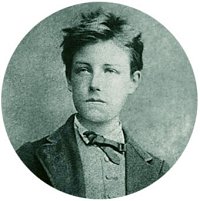
Arthur Rimbaud
(1854-1891)
Chant de guerre parisien
Le Printemps est évident, car
Du cœur des Propriétés vertes,
Le vol de Thiers et de Picard
Tient ses splendeurs grandes ouvertes !
Ô Mai ! quels délirants culs-nus !
Sèvres, Meudon, Bagneux, Asnières,
Écoutez donc les bienvenus
Semer les choses printanières !
Ils ont schako, sabre et tam-tam,
Non la vieille boîte à bougies
Et des yoles qui n’ont jam, jam…
Fendent le lac aux eaux rougies !
Plus que jamais nous bambochons
Quand arrivent sur nos tanières
Crouler les jaunes cabochons
Dans des aubes particulières !
Thiers et Picard sont des Éros,
Des enleveurs d’héliotropes,
Au pétrole ils font des Corots :
Voici hannetonner leurs tropes….
Ils sont familiers du Grand Truc !..
Et couché dans les glaïeuls, Favre
Fait son cillement aqueduc,
Et ses reniflements à poivre !
La Grand’ville a le pavé chaud,
Malgré vos douches de pétrole,
Et décidément, il nous faut
Vous secouer dans votre rôle…
Et les Ruraux qui se prélassent
Dans de longs accroupissements,
Entendront des rameaux qui cassent
Parmi les rouges froissements !
Arthur Rimbaud poetry
fleursdumal.nl magazine
More in: Archive Q-R, Arthur Rimbaud, Rimbaud, Arthur, Rimbaud, Arthur

Raymond Radiguet
(1903-1923)
Nues
Au regard frivoles les nues
Se refusent selon la nuit
Vers l’aurore sans plus de bruit
Dormez chère étoile ingénue
Sous les arbres de l’avenue
Les amours ne sont plus gratuits
Au regard frivoles les nues
Se refusent selon la nuit
Deux étoiles à demi nues
Semblables soeurs nées à minuit
Chacune son tour nous conduit
À des adresses inconnues
De vos regards frivoles nues
Raymond Radiguet poésie
fleursdumal.nl magazine
More in: Archive Q-R, Radiguet, Raymond
Lizette Woodworth Reese
(1856–1935)
Thomas A Kempis
Brother of mine, good monk with cowlëd head,
Walled from that world which thou hast long since fled,
And pacing thy green close beyond the sea,
I send my heart to thee.
Down gust-sweet walks, bordered by lavender,
While eastward, westward, the mad swallows whir,
All afternoon poring thy missal fair,
Serene thou pacest there.
Mixed with the words and fitting like a tune,
Thou hearest distantly the voice of June,—
The little, gossipping noises in the grass,
The bees that come and pass.
Fades the long day; the pool behind the hedge
Burns like a rose within the windy sedge;
The lilies ghostlier grow in the dim air;
The convent windows flare.
Yet still thou lingerest; from pastures steep,
Past the barred gate the shepherd drives his sheep;
A nightingale breaks forth, and for a space
Makes sweeter the sweet place.
Then the gray monks by hooded twos and threes
Move chapelward beneath the flaming trees;
Closing thy book, back by the alleys fair
Thou followest to prayer.
Born to these brawling days, this work-sick age,
Oft long I for thy simpler heritage;
A thought of thee is like a breath of bloom
Blown through a noisy room.
For thou art quick, not dead. I picture thee
Forever in that close beyond the sea;
And find, despite this weather’s headlong stir,
Peace and a comforter.
Lizette Woodworth Reese poetry
fleursdumal.nl magazine
More in: Archive Q-R, CLASSIC POETRY, Thomas a Kempis

Arthur Rimbaud
(1854-1891)
Bottom
La réalité étant trop épineuse pour mon grand caractère, — je me trouvai néanmoins chez ma dame, en gros oiseau gris bleu s’essorant vers les moulures du plafond et traînant l’aile dans les ombres de la soirée.
Je fus, au pied du baldaquin supportant ses bijoux adorés et ses chefs-d’œuvre physiques, un gros ours aux gencives violettes et au poil chenu de chagrin, les yeux aux cristaux et aux argents des consoles.
Tout se fit ombre et aquarium ardent. Au matin, — aube de juin batailleuse, — je courus aux champs, âne, claironnant et brandissant mon grief, jusqu’à ce que les Sabines de la banlieue vinrent se jeter à mon poitrail.
Arthur Rimbaud poetry
fleursdumal.nl magazine
More in: Archive Q-R, Arthur Rimbaud, Rimbaud, Arthur, Rimbaud, Arthur
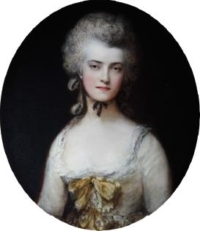
Mary Darby Robinson
(1757?-1800)
Beauty
Beauty, the attribute of Heaven!
In various forms to mortals given,
With magic skill enslaves mankind,
As sportive fancy sways the mind.
Search the wide world, go where you will,
VARIETY pursues you still;
Capricious Nature knows no bound,
Her unexhausted gifts are found
In ev’ry clime, in ev’ry face,
Each has its own peculiar grace.
To GALLIA’s frolic scenes repair,
There reigns the tyny DEBONAIRE;
The mincing stepthe slender waist,
The lip with bright vermilion grac’d:
The short pert nosethe pearly teeth,
With the small dimpled chin beneath,
The social converse, gay and free,
The smart BON-MOT and REPARTEE.
ITALIA boasts the melting fair,
The pointed step, the haughty air,
Th’ empassion’d tone, the languid eye,
The song of thrilling harmony;
Insidious LOVE conceal’d in smiles
That charmsand as it charms beguiles.
View GRECIAN MAIDS, whose finish’d forms
The wond’ring sculptor’s fancy warms!
There let thy ravish’d eye behold
The softest gems of Nature’s mould;
Each charm, that REYNOLDS learnt to trace,
From SHERIDAN’s bewitching face.
Imperious TURKEY’s pride is seen
In Beauty’s rich luxuriant mien;
The dark and sparkling orbs that glow
Beneath a polish’d front of snow:
The auburn curl that zephyr blows
About the cheek of brightest rose:
The shorten’d zone, the swelling breast,
With costly gems profusely drest;
Reclin’d in softly-waving bow’rs,
On painted beds of fragrant flow’rs;
Where od’rous canopies dispense
ARABIA’s spices to the sense;
Where listless indolence and ease,
Proclaim the sov’reign wish, to please.
‘Tis thus, capricious FANCY shows
How far her frolic empire goes !
On ASIA’s sands, on ALPINE snow,
We trace her steps where’er we go;
The BRITISH Maid with timid grace;
The tawny INDIAN ‘s varnish’d face;
The jetty AFRICAN; the fair
Nurs’d by EUROPA’s softer air;
With various charms delight the mind,
For FANCY governs ALL MANKIND.
Mary Darby Robinson poetry
fleursdumal.nl magazine
More in: Archive Q-R, CLASSIC POETRY
Thank you for reading Fleurs du Mal - magazine for art & literature